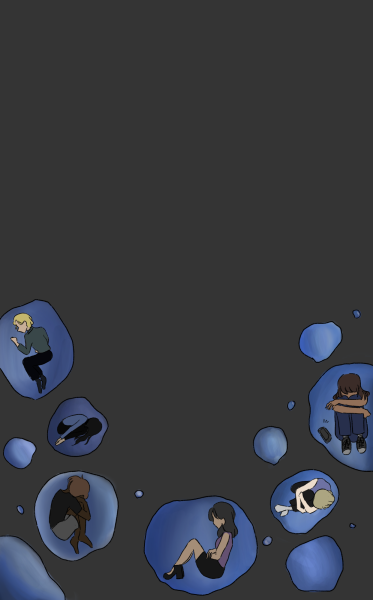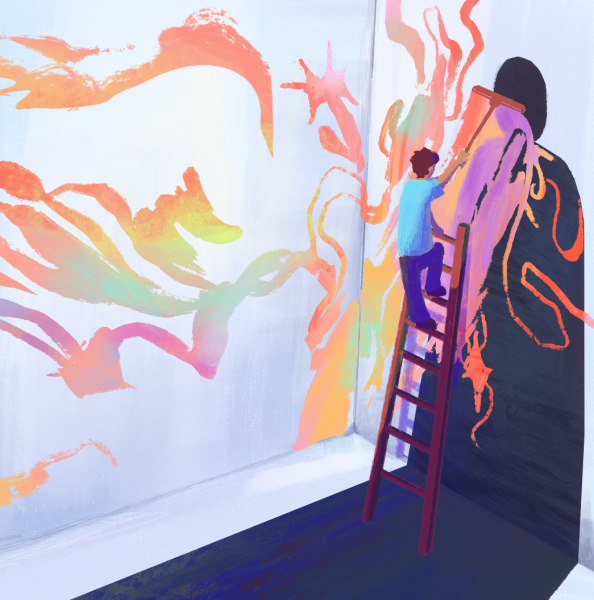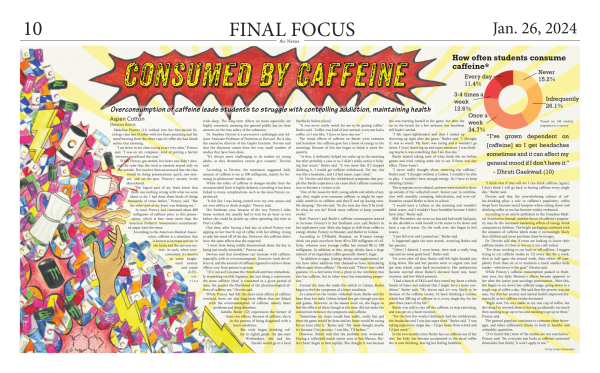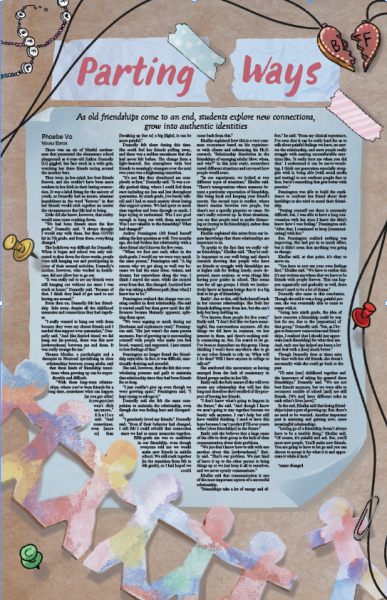Gasping for Air
As students try to stay afloat in isolation, a competitive academic environment breeds toxic relationships with productivity.

Ever since she was young, Joy Xu (12) believed that the only way to be successful was to do her absolute best, and the only way to do her absolute best was to never take breaks. Ever.
Xu expected a lot of herself. She held a reputation for academic success and achievement among her peers, which pushed her to work harder to maintain that image. She had been raised with the belief that in order to get ahead, she had to work hard when others weren’t.
Xu carried these beliefs into high school, where things took a turn for the worse.
“It got really unhealthy nearing the end of sophomore year,” Xu said. “At that point, we were all in quarantine so nobody was really going anywhere, but I took it a step further and essentially isolated myself. I left my phone off, didn’t talk to anyone, and wouldn’t go out either. I had created a daily 8 a.m.-6 p.m. study plan, and I would do my best to follow that plan because I thought I needed to make the most out of the time I had.”
Xu’s fear of failure prevented her from freely enjoying any activity outside of work, believing it would hold her back from achieving her academic potential.
“Even if I had studied the whole day and I was taking the night off to watch a television show, I would feel so guilty,” Xu said. “I just felt so empty and unmotivated but with that lack of motivation, I also felt guilty because I felt like I wasn’t doing enough. So as I was feeling horrible for not doing anything, I was then guilt-tripping myself for not doing anything. It turned into this cycle of self-hatred.”
According to psychologist Amy Gurka, our society reinforces the idea that success is based on the number or size of achievements we receive, rather than a deeper sense of personal satisfaction in our lives. This is the mindset that causes people to overwork themselves to stay ahead.
“This attitude is rooted in competition and can lead people to push themselves through overwork to try to stay at the front of the race,” Gurka said. “Unfortunately, after each success comes another, bigger challenge to be overcome and more work to do to earn the same sense of achievement. It becomes a vicious cycle.”
Ally Diep (12) encountered challenges like Xu’s in her own journey tackling toxic productivity. With the free time quarantine offered, Diep’s inner conflict between taking breaks and making the most out of her time caused her mental health to deteriorate.
“I had all this time suddenly because we were out of school, my swim practices were getting canceled, and I finally quit piano lessons,” Diep said. “I had all this time, so you would think I’d use it to take a moment to breathe, but no. I imposed work upon myself and as a result, I felt terrible going to bed every night and thinking that I would have to wake up and do more the next morning.”
Diep said she felt that peer pressure pushed her the most to work past her capabilities.
“It felt like everybody was getting 5’s on their [AP] tests, and then they were getting jobs, and then they were getting internships or executive member positions of some special nonprofit organization, and here I was baking cookies every day,” Diep said. “It just felt like I wasn’t doing enough.”
Like Diep, Emily Hauw (12) viewed academic success as a measure of self-worth, so she could not help feeling despair whenever she saw a peer achieving more than her.
“I saw kids stressing about having all AP classes while I’m here, stressing about only two,” Hauw said. “It was a joke at first, but then seeing them be successful in their classes while I continued to struggle with my APs made me feel terrible.”
According to Gurka, adolescents’ reliance on peer support can lead them to follow or make decisions based on how their peers behave rather than what is best for them as an individual.
“The relationships that teenagers build with each other are the most important relationships to them at that time in their life,” Gurka said. “If their peers are high-achieving and believe that overwork is the only way to get what they want, they may come to view this attitude as reality. Teenagers who base their self-esteem on external accomplishments and praise are especially vulnerable to overworking.”
Xu said there was no healthy source of motivation that drove her to work hard. She believed this was only the standard for what she needed to do to earn the grade and get into the college she desired.
“I was always so tired and fatigued but I would still overwork and overbook myself at the same time because I had this idea that if I overbooked myself, I was doing my best,” Xu said. “Though, in reality, it was really just tiring me out. I would start pushing people away which made my mental health worse since I was taking away my opportunities to socialize and talk about my problems.”
There are varying reasons for why students might cross the line and go from productivity to overworking, said Gurka.
“These might include a natural tendency of the individual toward high achievement, peer academic behaviors and attitudes towards the value of achievement, or fear of failure, to name a few,” Gurka said. “In general, teenagers today seem to be more stressed and more pressured than ever. Expectations are higher, workloads are more intense, and the pressure to succeed and stand out from peers is greater than in the past.”
Diep’s harmful mindset began around the end of her sophomore year. She heard her friends discuss their college applications and in order to keep up with them, she decided she would start working on her college applications as well. This was the moment she realized what she was doing wasn’t normal.
“I had some senior friends who questioned why I was starting [my college applications] so early and that was when I realized that I had no reason to do this,” Diep said. “Why am I doing this to myself when there are a bunch of other things that are just as productive and way more enjoyable that I could be spending my time on? That’s when I realized I needed to take a breather.”
While Xu and Diep differ in their reasons for developing a toxic relationship with productivity, the results are the same: exhaustion and burnout.
As Xu overworked herself and constantly beat herself up for taking any sort of break, she eventually reached a breaking point in her mental health.
“I had this one night where I was feeling more empty than normal, and I had a huge load of work to be done, but it wasn’t any work that was due for a grade,” Xu said. “It was prep work that I forced myself to think that I needed to do. I lied on the floor for about an hour and cried everything out. It felt like all the stress and emotion I suppressed had built up to that one moment. That was when I understood I needed to change.”
Xu said she realized that there was more to life than getting into college. She understands now that the things she had been obsessing over for the past three years of her life were meaningless if she was tearing herself apart in the process.
“During the middle of this year, I began to develop a healthier mindset on work where if I’m tired, the chances of me doing quality work are so low that it is better that I don’t work at all,” Xu said. “Reminding myself of that helped calm me down, reassure me that it was okay to take breaks and that productivity isn’t a measure of worth.”
Gurka said that while the idea that success comes from hard work is true, it does not paint the whole picture.
“While work is a valuable part of achieving goals and we tend to feel good about ourselves when we are productive, we tend to not focus equally on learning about what makes life meaningful or on how to maintain personal wellness as measures of success,” Gurka said.
For instance, whenever Xu was stressed out about school work, her brain would overflow with all sorts of irrational ideas to constantly work without rest. Xu said she thought she would try using positive affirmations as a way to soothe her mind and teach herself that to rest is to be productive.
“I tell myself that it’s alright to take breaks, that nobody is working 24/7 around the clock, and nobody is going to be constantly productive,” Xu said. “By repeating affirmations, I’m able to reassure myself that it’s normal to step away from doing work.”
Although Xu is still in the process of letting these unhealthy habits go, she said she already feels as though she is in a better place than she used to be.
“I think the mindset change has made me a lot happier and a lot freer,” Xu said. “The thought that there is more to life than school has helped me because I no longer have to justify going out or not doing work, since work isn’t the only part of life.”
Alternatively, Diep tried balancing her work and personal life by providing a reward for every day that she worked hard.
“For example, I would give myself one day at the beach or two episodes of anime, or I would bake croissants, something along those lines,” Diep said. “An activity that was stress-free and enjoyable would motivate and refresh me to start again. I’m trying to put myself into a healthier cycle of work and reward.”
Diep also points out that recognizing the importance of balance and understanding how she worked helped her figure out how to make her work and reward cycle.
“I think there is value in knowing what kind of worker you are and what bogs you down,” Diep said. “Once you start thinking about that and understanding that, it works out. Once you understand that about yourself, you’ll be fine.”
Gurka said that the first step of handling stress is to recognize when it is having a negative impact on your life and to work to find your own unique balance.
“Once people acknowledge that stress and overwork have gotten out of control, they can begin to look at ways to introduce more balance back into their lives,” Gurka said. “Usually, this involves focusing back on healthy habits, such as sleep, diet, meditation, and exercise.”
However, it’s difficult to understand one’s limitations and needs when their mind is clouded with distractions. In the eleventh grade, Hauw was unable to spare any time to figure out what kind of worker she was, struggling to barely complete all her assignments on time while dealing with issues in her personal life.
Her experience with toxic productivity began when her younger sister, Caitlynn Hauw (11), started to struggle with her mental health, leading Emily to take time away from school.
Emily had been best friends with Caitlynn in her childhood and often compared herself to her. Her wellbeing often reflected her sister’s so when Caitlynn began struggling with her mental health, Emily’s followed suit.
“With [Caitlynn] going through a lot of mental health issues, I had to take a lot of time off from school,” Emily said. “There were many late nights away from my computer, away from my work so that made my worries worsen.”
Though Emily worried for her sister’s health, her concerns about her own academic standing distorted her priorities.
“I’ve challenged myself more last year than in past years so seeing [her] struggle with [her] mental health kept making me compare myself to [her] more than I usually did,” Emily said. “I constantly wondered whether I was doing enough or if I was trying hard enough.”
As she continued to miss school to visit her sister in the hospital, Emily said that she reached a point where she thought Caitlynn was ruining her chances of having a successful junior year.
“I wasn’t even thinking about my [sister] at that point,” Emily said. “Instead, I was worried about needing to email all my teachers, telling them that I wouldn’t be able to complete an assignment and that I’d have to make it up.”
Looking back, Emily recognized how severely the impact of academic achievement influenced her.
“I was super disappointed in myself for being more worried about getting an A on an assignment or turning homework in on time than about [Caitlynn] that was in the hospital,” Emily said. “It was sad to see it get that bad and to prioritize school over my family.”
Emily barely took any time off for herself to breathe as she was suffocated by her school work and hectic personal life. However, when she was able to have a minute to herself, she could only focus on what her peers were accomplishing and what she wasn’t accomplishing.
Afraid to reach out to anyone about this, Emily’s mental health continued to decline.
“I ended up having to see a therapist because I was having suicidal thoughts,” Emily said. “I was in this place where I didn’t want to reach out to my teachers and have them hear what I assumed was what a lot of other kids were saying. You know, the whole ‘I’m struggling with mental health, and I have to take a step back from school’ shtick. I just didn’t want to be that student.”
According to Gurka, overworking can lead to various physical and mental consequences.
“Over a prolonged period of time, overworking can lead to exhaustion, physical and mental fatigue, and burnout,” Gurka said. “Some people may experience an increase in depression and/or anxiety if they push too hard for too long. In the most severe cases, thoughts about self-harm or self-harm behavior may occur.”
But, when Caitlynn began recovering, Emily was inspired by seeing that process and was able to get back up and return to where she used to be: healthy and happy.
“Seeing her healing process from how badly she was struggling to then taking small steps towards recovery with the support of my family and her teachers really motivated me to take steps to break my toxic mindset as well,” Emily said. “I felt more confident that I was capable of getting back to where I used to be.”
Despite this newfound motivation to recover, Emily was not able to accomplish that goal all on her own.
“Having a good relationship with my teachers got me through that really tough time,” Emily said. “I genuinely think I wouldn’t have been able to get through all of my struggles without being able to communicate with some of my teachers. Even after that rough period of time, my teachers would check up on me and ask my parents if I was alright.”
Both Hauw and Xu created a support system by building up the courage to reach out and speak openly about their issues. This first step allowed the two to break through the shell they had built around themselves and rely on others for reassurance.
Finding someone you trust to confide in is a good small step toward building a support system. Receiving care from loved ones and reaching out to teachers, Emily said, greatly helped her on her road to recovery.
“Everyone is going at their own pace,” Emily said. “There is no one way to become successful or productive. I struggled with that before, especially with seeing all the accomplishments my peers have made, but I’m proud of what I’ve done.”












